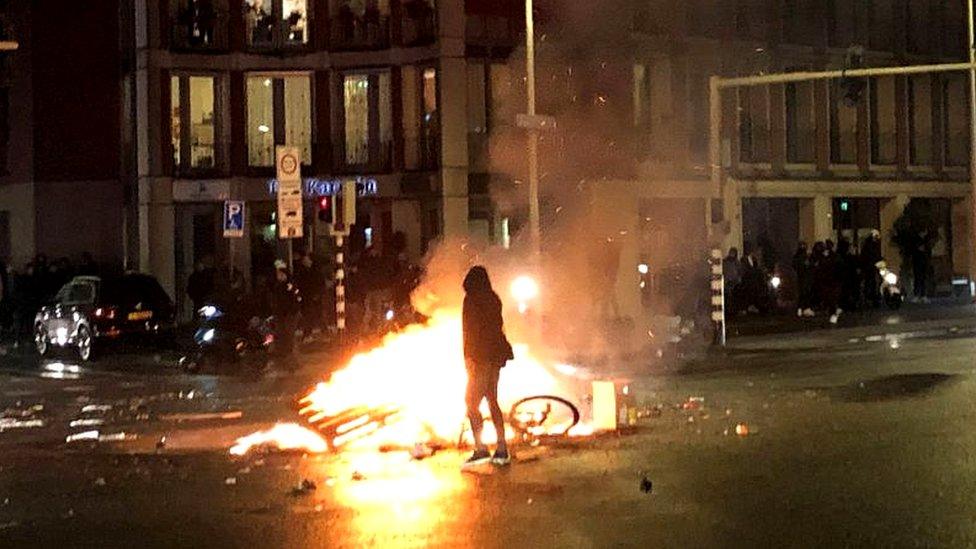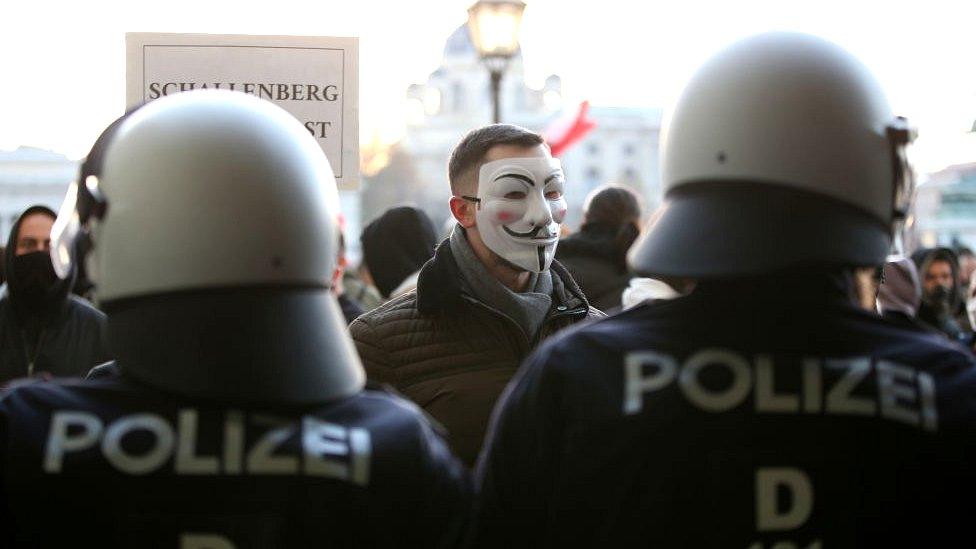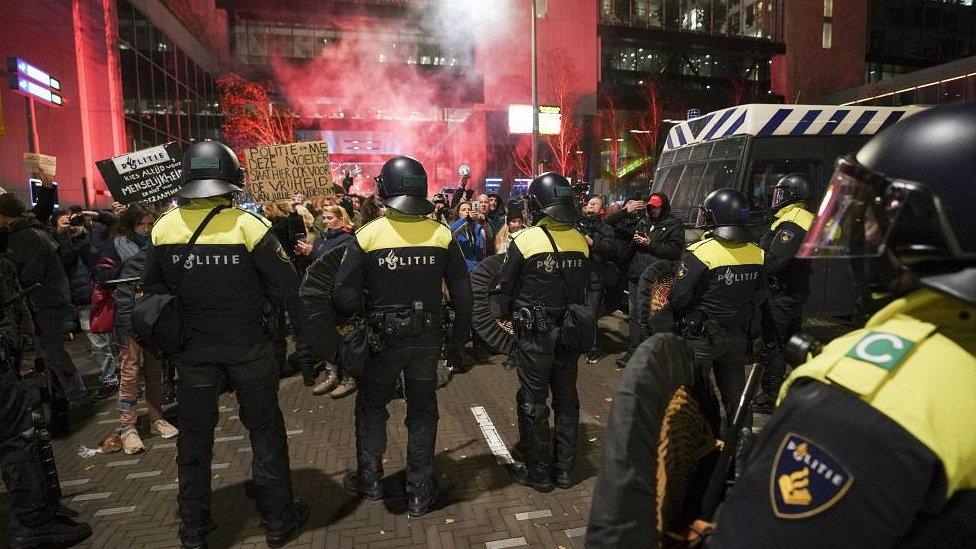Covid: Conspiracy and untruths drive Europe's Covid protests
- Published

Recent protests in European cities have led to violent scenes and confrontations with the police
Further Covid protests are being planned this weekend in Austria and the Netherlands, after recent demonstrations against reimposed coronavirus restrictions tipped over into violence.
Many of the concerns being expressed, both on the streets and in social media posts, contain legitimate questions about recent political decisions, but there is also a plethora of false information being spread by those involved in the protests.
From unfounded accusations that the vaccine is a plot to poison the population, to criticism of governments as "dictatorships on the march" - more extreme sentiments are being shared alongside general anger over political choices.
"The violence is needed because there needs to be change," organiser Ricardo told BBC Newsnight, after Dutch protesters fought with riot police.
In Austria, the newly-formed, anti-vaccination, People, Freedom, Fundamental Rights party (MFG), has been instrumental in planning the recent protests on the ground.
The MFG has drawn spurious parallels between Covid restrictions and Nazi rule, using inflammatory words like "dictatorship" and "apartheid".
The Austrian far-right Freedom Party (FPOe), the third largest in Austria's parliament, is also strongly opposed to Covid restrictions. Its new leader has expressed false and misleading views, including describing the vaccination programme as a genetic experiment.
These same phrases can be found littered throughout groups on Facebook, of people who turned out to protest in Austria last week - as the country returned to a full national lockdown.

Far-right politicians in Austria have called for street protests against Covid restrictions
Opposition to lockdowns and Covid passes is not limited to the far right, however, with dissent coming from a range of voices in Austria, according to research by BBC Monitoring.
A mistrust of those in power
On Twitter, an Austrian rapper posted a cartoon showing two men in prison - one for killing six people, the other for being unvaccinated - evoking an imagined future where people might be incarcerated for refusing to have a Covid jab.
It reveals a shared fear of governments abusing their power - although the same rapper has also posted a number of more outlandish conspiracy theories, including about the Great Reset.
Recent research carried out in Austria suggests, external a low trust in the Covid vaccine is strongly associated with a low trust in authority more generally.
Among Dutch protesters, members hark back to Nazi occupation amid unfounded beliefs that vaccines are poisonous or part of sinister global plot, with memes which compare a QR code to a Swastika.
An EU-commissioned survey tracked trust in governments, external and found some of the biggest falls were in Austria and Croatia between the spring of 2020 and 2021 - both countries where protests have recently broken out.

Riot police were deployed to contain recent protests in the Netherlands
In Russia, although mistrust of the authorities is not expressed on the streets - because unsanctioned street protest is banned - it is clearly present online.
Protests at the introduction of vaccination certificates are widespread on social media, says Olga Diakonova of the BBC Russian service in Moscow - driven by a mistrust in the government and authorities more generally. Vaccination levels in Russia are amongst the lowest in Europe.
Earlier in the year, Prof Melinda Mills, at the University of Oxford, warned the introduction of vaccine passports carried "a risk of unjustly discriminating in hiring, attending events, insurance [and] housing applications", but said these concerns needed to be balance with legal and ethical duties to protect people's health.
But Miro Dittrich, at the German think tank the Centre for Monitoring, Analysis and Strategy (CeMAS), believes people with those types of concerns don't make up the majority of protesters.
"If you look at the organisers, if you look at the people who mobilised these events, these are not people with rightful concerns - these are people with conspiracy narratives or far-right views," he says.
Watch: Water cannons and tear gas fired at Covid protesters in Brussels
An online group involved in organising the Austrian protests claims vaccines are "turning out to be more and more ineffective". But this is not supported by the evidence from rigorous clinical testing, nor the practical policy of injecting billions of people worldwide with the various vaccines available.
Multiple studies show vaccines are very effective at preventing hospitalisation and death, and can also play a role in reducing transmission and symptomatic disease.
No medicine is risk-free, but complications are rare and most are not serious, paling in comparison with the potential harm caused by Covid, even to younger people.
Such social media posts overstate the risk of the vaccine, while understating the risk of the virus.
Along with valid questions about whether things like mandatory vaccinations and vaccine passes might have the potential to discriminate, highly misleading and false information is also circulating on social media, where many of these street protests are being organised.
"There are, of course, lots of people who have genuine frustrations with restrictions in place in their own country,'" Ciaran O'Connor, a researcher at the Institute for Strategic Dialogue, who monitors disinformation and extremism online, told BBC Newsnight.
But Mr O'Connor explained "the danger of these kinds of events, or groups, or movements is that they represent a potential pathway towards radicalisation or towards extremism, because they are basing their arguments on misinformation, misleading claims and conspiracies".
Additional reporting by Marianna Spring
Follow Rachel on Twitter, external or get in touch rachel.schraer@bbc.co.uk
